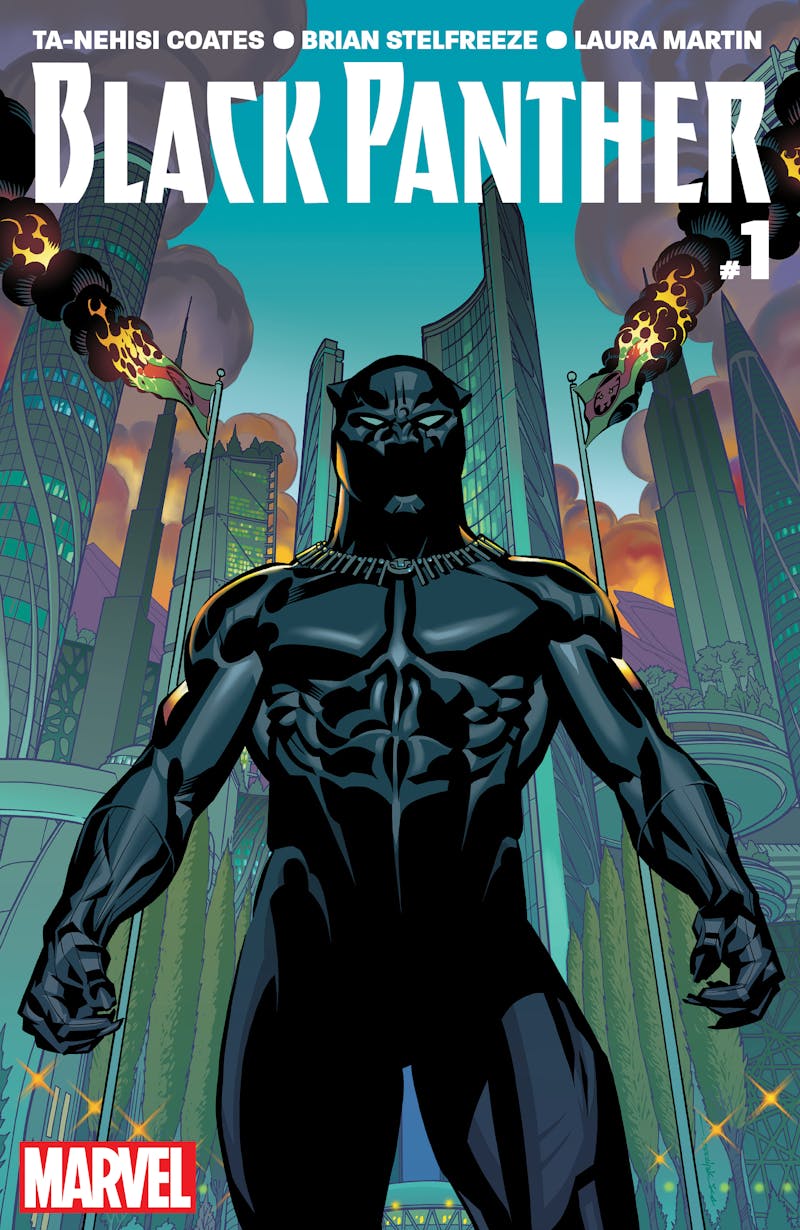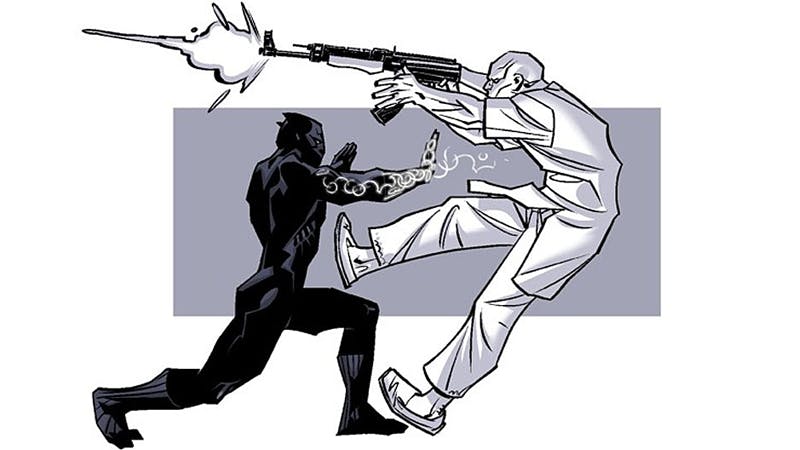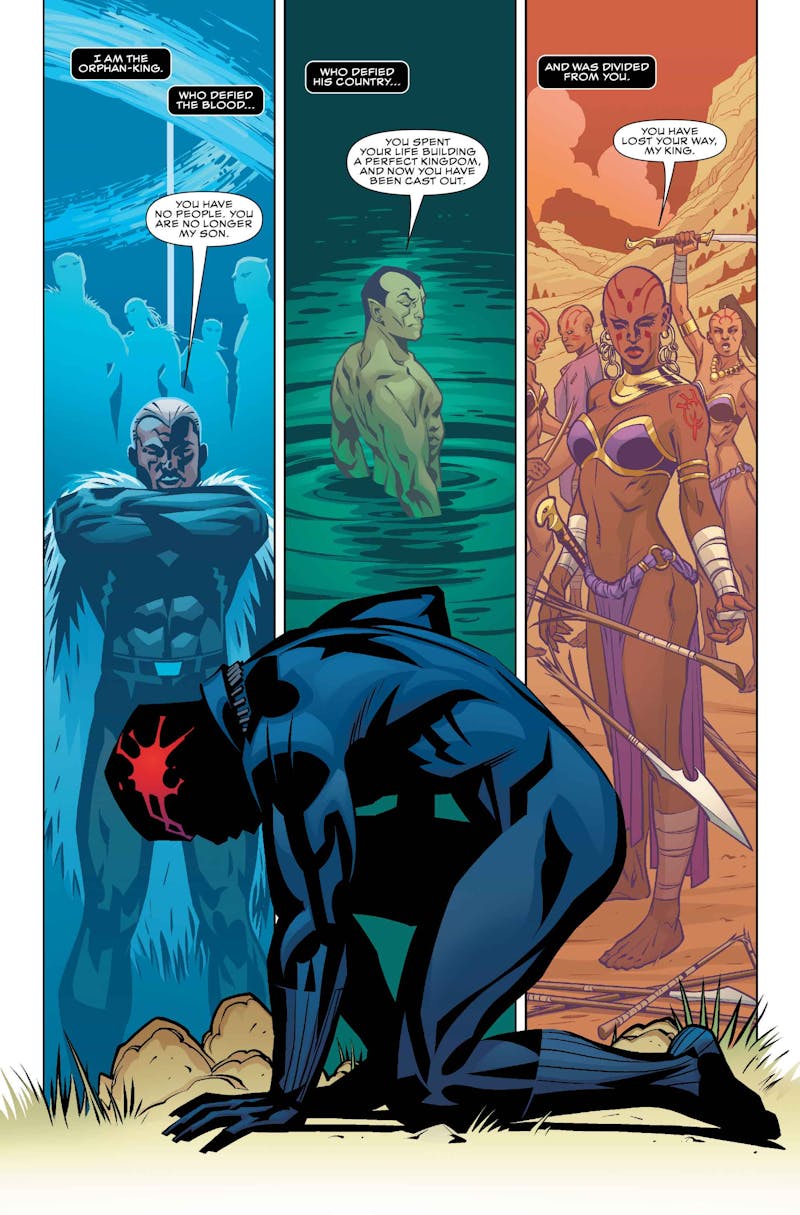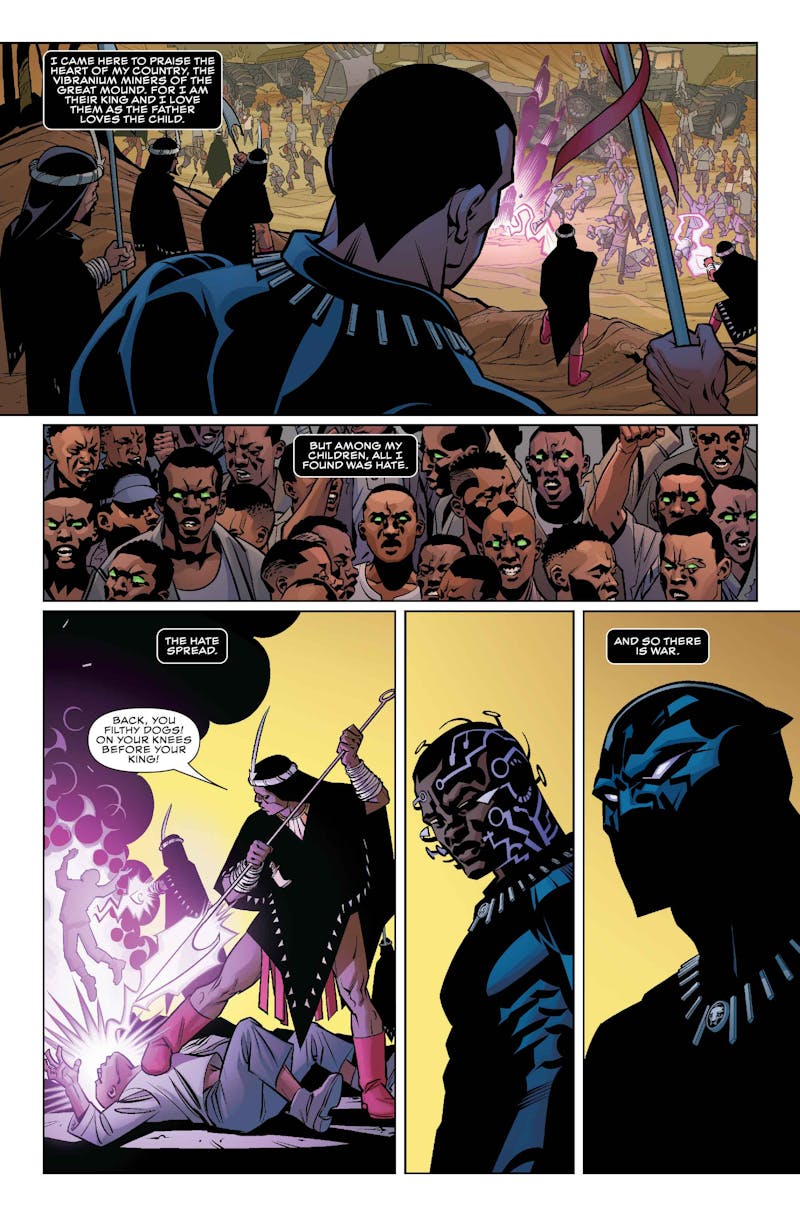
Fifty years ago, Stan Lee and Jack Kirby changed the face of comics when they introduced the first superhero of African descent, the Black Panther, in Fantastic Four #52. As the hereditary ruler and protector of the fictional African nation of Wakanda, the Black Panther is as accomplished a scientist as he is a strategist. Within the cloistered world of comics he’s long been a fan favorite—featuring, for example, in the Avengers, the Fantastic Four, alongside Daredevil, and as a central member of Marvel’s Illuminati—even if he’s had a lower profile than some of Marvel’s other heroes. This promises to change in 2016, thanks to the efforts of two Howard University alumni: Chadwick Boseman who plays the Black Panther this summer in Marvel’s latest blockbuster, Captain America: Civil War; meanwhile, Ta-Nehisi Coates—2015 National Book Award winner and MacArthur fellow—scripts a new comic with a dramatic character arc for the character that debuts on April 6. Pre-orders for the first issue of Coates’s Black Panther have already exceeded 300,000 copies at various retailers, a remarkable feat given that 50,000 preorders for a new comic represents a smashing success. (Top selling comics like Ms. Marvel and The Walking Dead move around 100,000 physical copies monthly.) One of the most celebrated writers and cultural critics of his generation, Coates’s work on Black Panther promises to energize the field while attracting fans old and new to the character; it’s the most anticipated comic debut since Chris Claremont and Jim Lee’s X-Men #1 in 1991. I called across the pond to Paris to speak with Coates, my old classmate at Howard, and chat about all things Black Panther.
Jonathan W. Gray: How did you come to comics? I know part of this story, obviously, but you were raised by your father, who at one point was Chairman of the Maryland Black Panther Party. Why do you think he allowed you to read something as ‘frivolous’ as comics?
Ta-Nehisi Coates: Well, my dad loved comics, he read them when he was a kid. In my household we were urged to read black writers but my parents didn’t care if we also read white writers. They were just happy that we were reading. My dad used to take me out to Geppi’s Comic World in Baltimore with my younger brother to pick up comics when I was a kid. Geppi’s back issue collection was overwhelming to me. I wanted to dig through them crates. When I would come across a footnote in an issue of Spectacular Spider Man referencing earlier events I would come back the following week and look for that issue.
JWG: You’ve clearly put a lot of thought into developing the world of Wakanda, I think you are the first writer since Don McGregor in the 1970s to really take readers through the various regions of this fictional nation. Talk about your thinking behind that.
TNC: When I spoke with Marvel about this project, one of the things we decided was that Wakanda had to be real. We wanted readers to want to spend time there. While McGregor’s prose-heavy style doesn’t fit into the modern way we script comics, he was very Wakanda obsessed, as if the outside world didn’t exist, and I wanted to build on that. Of course, people are showing up to see T’Challa [the Black Panther], but I want to show more and more of Wakandan society and I will as my run on Black Panther continues.
JWG: Continues? So you’re going to be writing the character beyond the eleven issue “A Nation Under Our Feet” story arc that’s been announced?
TNC: Well, right now I’m working on the script for issue 12, a coda to the first arc, but yeah, I’m going to stay with the character for a little while. I’d like to really put my stamp on the character. When I think about part of what I want to accomplish with Black Panther, I think about Matt Fraction’s run on Invincible Iron Man and Joss Whedon’s run on Astonishing X-Men. I want to leave a similar mark. Listen, when I was a kid Spider-Man was the North Star for me, and I would like for some young person to feel that one day about my efforts on Black Panther.
JWG: You’ve given the Black Panther new abilities, what you call soul-stalking and a kinetic burst where his costume releases a flash of energy. What was your thinking there?

TNC: Firstly, I wanted all of his new powers to emerge out of what already existed in the character. With the soul-stalking I just wanted to build upon the notion that he had superhuman senses that allowed him to track his prey, and make them paranormal, almost like a sixth sense. You’ll see that ability develop over the course of my run. Part of this was fun but I also wanted to establish that T’Challa isn’t exactly the same character post-Secret Wars.
JWG: On Twitter you spoke about wanting to challenge heteronormativity in the pages of Black Panther. You clearly do this through Zenzi, and also with the relationship between Aneka and Ayo.
Yes. Arc is a post-colonial, post-modern, deconstructionist look at militarism, imperialism and heteronormativity. https://t.co/LHemNDt6AU
— Ta-Nehisi Coates (@tanehisicoates) March 14, 2016
Why was this so important for you?
TNC: I think on Twitter people thought I said it tongue in cheek, but people are going to be surprised that it’s actually in the book. I was uncomfortable with the notion of the Dora Milaje—a scantily clad troop of female bodyguards devoted to the Black Panther. It felt like a male fantasy, they seemed to me almost to be jewelry for the Black Panther. But I’m not big on ret-conning things, so I wanted to build on what was already established. Ryan Coogler’s Creed was an inspiration for me in this regard. He didn’t dismiss what came before, he built on what was there and as a result healed Rocky as a character. So, if I was going to extend full humanity to the Dora Milaje, what might that mean, what might happen?

JWG: In your first memoir, The Beautiful Struggle, you talk about “an entire shadow canon, a tradition of writers who grabbed the pen, not out of leisure but to break the chain.” How does your work on Black Panther fit into this tradition?
TNC: This is why I included the Henry Dumas poem [in issue #3]. I wanted to incorporate the poets from the Black Arts Movement into the canon of comics. Those are the people who taught how to write. Those were the writers who made space in their poetry to explore questions of democracy and self-determination. But I also was inspired by Avengers #57, “Behold the Vision,” which ends with Shelly’s “Ozymandias.” I just figured if they could fold British literature into a comic I could include African American literature in mine. That’s also the inspiration behind Changamine (a bookish political philosopher who is the intellectual leader of those Wakandans opposed to hereditary rule). This tradition informs us, and I wanted to represent that.
JWG: You also sneak in a lot of cultural references, from Bob Marley to Jeru tha Damaja.
TNC: [Laughs] Yeah. The one paraphrased most often throughout the first arc is the idea that “no one man should have all that power.” I mean, it just makes sense to allude to Malcolm X, to Kanye, to Bob Marley. That’s what shaped me. I have to put that in there! As someone raised within a black literary and cultural tradition—that’s what I bring to bear.
JWG: With that in mind, talk a bit about Afro-futurism. Wakanda is often cited as an Afro-futurist space. Did those ideas influence you?
TNC: Not really. I’m not really up on Afro-futurism, not like Brian [Stelfreeze, the artist and illustrator Coates collaborates with on Black Panther]. So you will see Afro-futurism in the comic through his work. I follow his lead when it comes to that.
JWG: How do your instincts as a journalist and social historian inform your work on Black Panther?
TNC: As you well know, if you go to Howard University you are instantly disabused of the great man theory of history. A basic question that I explore in my journalism rises out of the legacy of the Enlightenment, which has all of these noble ideas about rights. But can the regime of rights extend to all people? Once you ask this question you are investigating how states operate, how they grant rights to their citizens. That’s a huge question for me and consequently one of the things I’m trying to get at in the book. Earlier versions of T’Challa gave you the romance of monarchy without any account of the horrible things that monarchs actually do. So I wanted to think this through. Don’t get me wrong, I like T’Challa but that’s the point. So often it’s not evil people, it’s the system.

JWG: Having read the scripts for the first four issues of your run, I can say that your T’Challa is quite a complicated figure.
TNC: Yeah, I’m trying to depict a human T’Challa. I like him a lot, I identified with him quite a bit to be honest. I mean, the last year or so has been amazing for me, but there are some aspects of it that I didn’t ask for, so I was interested in all of the things in his world that he didn’t ask for. He’s a genius, one of the smartest people in the world, but as a head of state a significant part of his job is managing a bureaucracy. Does this satiate a need in him, or is he simply bound by the traditions and customs of his nation? Others have portrayed T’Challa as arrogant, which distances the reader from the character, but re-reading those earlier issues I was struck by the idea that T’Challa doesn’t actually like being a king. I mean, who is a king and just leaves his nation for long periods of time to fight with the Avengers? Who does that? At one point he was working as a teacher in Harlem! I thought it would be interesting to explore a character who had to be King but perhaps didn’t want to be King. That’s T’Challa. I see him as a man in conflict.
This article has been updated.